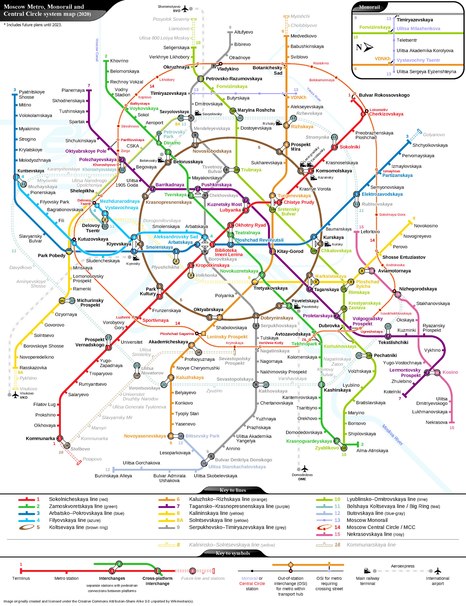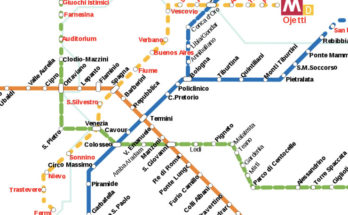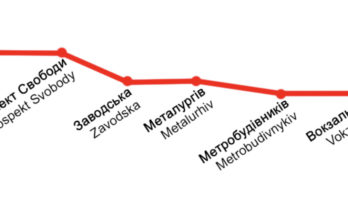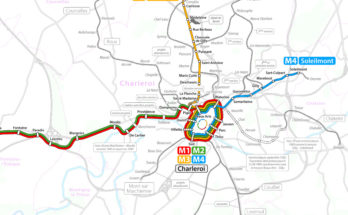The Moscow Metro is also known as the underground palace. It’s the most used metro system in the world. It has the highest passenger density in the world. In 2011 it transported about 2400 million of passengers.
The Metro is the easiest and the most reliable way to travel around Moscow. It has a circular line that links all metro lines. This way, you can reach any destination in the city with a maximum of two line transfers. Each line has a name, a number and a color that identifies it. The circle line also connects with the main train stations.
- Known as: Metro
- Dimentions: Lines 2, 6, 7, 9, and 10 has 8 cars each; lines 1, 3 and 8 has 7 cars and lines 4, 5 and 11 has 6 cars each. Every car has 64ft long and 4 doors in both sides.
- System length: 321kms
- Lines: 12 lines
- Stations: it has 185 stations; these include underground stations, ground-level stations and elevated stations.
- Speed: 26 MPH
- Operator: Moskovsky metropolitén
- Average ridership: 7 million people/day. The world’s highest.
- Start of operation: The first line was opened in May 15, 1935, between Sokolniki and Park Kultury.
Moscow metro lines and stations
- Line 1: Sokol’nicheskaya (Сокольническая.). It is the red line. It has 19 stations and 26.2 km.
- Line 2: Zamoskvoretskaya (Замоскворецкая.). It is the dark green line. It has 20 stations and 36.9 km.
- Line 3: Arbatsko-Pokrovskaya (Арбатско-Покровская). It is the blue line. It has 18 stations and 37.7 km.
- Line 4: Filyovskaya (Филёвская). The light blue line. It has 13 stations and 14.9 km.
- Line 5: Kol’tsevaya (Кольцевая). The brown line. It is the circular line. It has 12 stations and 19.3 km.
- Line 6: Kaluzhsko-Rizhskaya (Калужско-Рижская). The orange line. It has 24 stations and 37.9 km.
- Line 7: Tagansko-Krasnopresnenskaya (Таганско-Краснопресненская). The pink line. It has 19 stations and 35.9 km.
- Line 8: Kalininskaya (Калининская). It’s the yellow line. It has 7 stations and 13.1 km.
- Line 9: Serpukhovsko-Timiryazevskaya (Серпуховско-Тимирязевская). The gray line. It has 25 stations and 41.5 km.
- Line 10: Lyublinskaya (Люблинско-Дмитровская). The light green line. It has 12 stations and 20.7 km.
- Line 11: Kakhovskaya (Каховская). The teal line. It has 3 stations and 3.4 km.
- Line L1: Butovskaya (Бутовская). The line L1 is called “light rail”. It was designed with different rules to the rest of the system and its platforms are only 96 m long. It has 5 stations and 5.5 km.
Moscow Metro schedule and frequency:
The Metro starts to move at 6 am, the doors open from 5:40am to 1:00am and the last train passes at 1:00am. The trains run every 90 seconds during peak hours and 2-4 minutes the rest of the day.
The monorail runs from 7:00am to 11:00pm. And it cost 28 rubles for a ticket and 1230 rubles for a monthly pass.
Moscow Metro rates:
- Single Trip: 28 rubles (valid for 5 days).
- 2 Trips: 56 rubles (valid for 5 days).
- 5 Trips: 135 rubles (valid for 45 days).
- 10 Trips: 265 rubles (valid for 45 days).
- 20 Trips: 520 rubles (valid for 45 days).
- 60 Trips: 1245 rubles (valid for 45 days).
- Monthly Pass: 1230 rubles.
- Children under 7 years can travel free.
Moscow connection to the airport
An Express Train connects the airport to Paveletky station in Moscow. The travel time is around 40 minutes and the cost of the trip is 120 rubles.
Curious facts about Metro of Moscow
In the Line 5 (is the one that intersects all the other lines) the loud-speakers tell travelers the direction of the train using male voices when moving clockwise and female voices when going counterclockwise. In the radial lines, male voices are used when trains are approaching the city center and female voices when they walk away from the city.
It is believed that there is an alternative underground system that would work parallel to the conventional metro system of the city. The system was supposedly built, or at least started, during the time of Stalin and was codenamed D-6 by the KGB. The Moscow Metro administration neither confirms nor denies the existence of this underground system alternative.
Moscow metro map
This post is also available in: French German Spanish Portuguese (Brazil)




